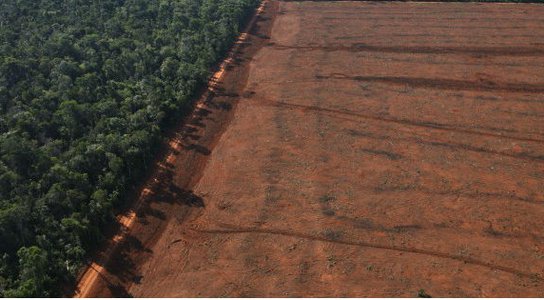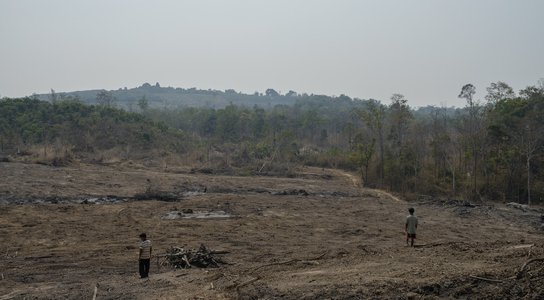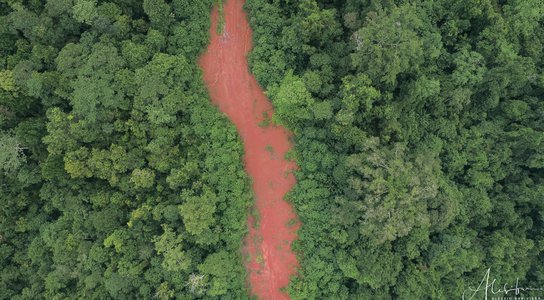It’s International Day of the Forests, yet the trees we desperately need to help tackle climate breakdown continue to be ploughed down. Adults and children alike, marching in their millions last week, understand the vital role forests play in storing and absorbing carbon emissions, protecting millions of species, and providing homes and livelihoods for many communities.
So why are our global forests still under threat? Tree cover loss has been rising steadily in tropical forests over the past 17 years, and 2017 was the second worst on record for tropical tree cover loss.
From the coffee drunk in cafes, to the palm oil in our chocolate and shampoo, the EU and the UK’s consumption of agricultural commodities is responsible for a significant share of this deforestation. On International Day of the Forests, and supported by the players of the People’s Postcode Lottery, we at Global Witness look at four worrying trends which show how our hunger for commodities is destroying climate-critical forests, and what we can do to counter that.
1. Governments are failing to stop industrial logging which is illegally and unsustainably plundering the rainforest
Industrial-scale logging continues to run rampant. A few months ago, we revealed that the forests of the tropical island paradise of the Solomon Islands – an important carbon sink – were being harvested at a scale 19 times over their sustainable limit, with much of that logging at high risk of being illegal.
A few weeks before that, we uncovered how many logging operations in biodiversity hotspot Papua New Guinea appear to be breaking the law, but continue to sell off timber from these climate-critical rainforests overseas.
And a few months before that, we exposed how European company Norsudtimber – the biggest single owner of logging concessions covering over 40,000 km2 of rainforest in the Democratic Republic of Congo – was operating illegally on 90% of its sites.
How is this being allowed to continue? A
lack of regulation in imports of illegal timber, particularly by China and Vietnam,
is allowing huge amounts of unsustainable and illegal timber to enter consumer
markets and be sold across the world.
A
lack of enforcement, by authorities in countries like France, Portugal,
Spain, Italy and Poland, are allowing that timber to enter shores where
regulation like the EU Timber Regulation does exist.
Stronger regulation and proper enforcement in consumer countries, as well as
action by governments in countries home to tropical rainforests, is needed if
countries are to meet climate targets and stop the mindless ransacking of
forests for profit.
2. Deforestation isn’t just having a devastating impact on the environment – it’s harming people too
When communities have their land taken from them, forests cut down or rivers polluted without their permission or even knowledge, they are given little choice but to take a stand. As soon as they speak up, they are no longer only affected communities: they become land or environmental defenders.
As agribusiness booms, tropical forests are logged and mining continues to deliver huge revenue to major global corporations, there are increasingly brutal attacks on these defenders.
The food on our plates, the rings on our fingers and the wooden furniture in our homes: all too often there is a violent reality behind household items we use every day. Governments and businesses alike need to recognise their responsibilities and use their power to be a force for good and help curb these attacks. Add your voice to our Defenders campaign here and get involved.
3. Companies are not abiding by their commitments on deforestation
We’ve all heard how our favourite company is dedicated to
sustainability and helping protect our planet. But how many are following
through on that claim?
Studies have shown that 27% of total global forest loss can be attributed to deforestation resulting from permanent land changes, in order grow commodities like palm oil, coffee, soya and much more. But this can be as high as 78% in South East Asia and 56% in Latin America. Despite corporate commitments, the rate of commodity-driven deforestation remains stubbornly high.
To end deforestation, companies must eliminate 5 million hectares of conversion from supply chains each year. That takes more than words – it takes strong action, with companies taking responsibility and rooting out deforestation in their investments and along their entire supply chains.
The
EU's has committed to step up action to tackle deforestation but this must
include regulatory change that requires companies and investors to conduct due
diligence to screen out deforestation.
You can take action too, by holding your favourite companies to account and
asking them, this International Day of Forests, how they're going to tackle
deforestation in a real and tangible way in the next five years.
4. Investments in commodities like rubber are helping drive mass deforestation
Revelations that Europeans’ money – and EU-based investors –
play a key role in funding projects linked to human rights abuses, land grabs
and large-scale environmental destruction, are far too common place.
Commodities like rubber, for example, can cause crippling amounts of deforestation. Our 2013 report Rubber Barons, for example, showed how rubber companies bankrolled by Deutsche Bank and Credit Suisse leased vast tracts of land for plantations in Laos and Cambodia, with disastrous consequences for local communities and the environment.
A new Sustainable Rubber Platform launched today by global tyre companies Pirelli, Goodyear, Michelin and more are a first small and important step in tackling this kind of deforestation - but more needs to be done by investors themselves.
With the political momentum building to make the corporate and financial sector more accountable for today’s vast sustainability challenges, the UK government and the European Union itself can be called on to create real change in this area.


